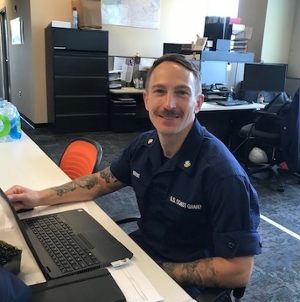Paul Krebs, Ph.D. '01
Helping People Quit Smoking and Researching Behavior Change

Paul Krebs, Ph.D. ’01 is a clinical psychologist interested in what motivates human behavior and how people change those behaviors -- so a psychology major at Scranton was a perfect fit.
He started his college career at Scranton in a different major, but he changed his mind after a long conversation in the dining hall with one of the Psychology Department professors.
“He sat down with me and said, ‘Tell me about your career goals and what you want,’ and he told me I have a scientific mind, so I thought, ‘Maybe I’ll investigate psychology a little more,’” Krebs says. “Scranton set the stage for what I should expect from mentoring relationships. It was great. It was the small class sizes with the personalization, the kindness. I realized afterwards that it is rare.”
Psychology professor and chair John C. Norcross, Ph.D., was also a mentor to Krebs. When Krebs decided he wanted to teach psychology, getting into graduate school and earning a Ph.D. was the next step. Norcross connected Krebs with his own graduate school mentor at the University of Rhode Island.
Krebs went on to earn his Ph.D. and started research on tobacco and smoking cessation behaviors.
Balancing Research Projects with Patient Care and Teaching
Krebs completed his internship -- required postdoctoral experience for licensed psychologists -- at the Veterans Affairs (VA) New York Harbor Health Care System. Afterward, he worked for three years at Memorial Sloan Kettering Cancer Center before returning to the VA. In his second stint there, Krebs received VA Career Award funding to help veterans receiving cancer treatment to stop smoking.
He also worked at the VA in San Diego and received a grant from the state of California to develop a nicotine cessation program focused on both cigarette smoking and vaping.
“Vaping has very much influenced the research and made necessary new ways of doing cessation programs. Vaping is a separate behavior,” Krebs says. “People can do it anywhere; it’s not offensive (like smoking).”
Krebs works on projects that help veterans and civilians alike stop smoking through a variety of methods, including text message and telephone support programs that supplement in-person tobacco counseling and coaching. His main message to patients is this: “Don’t try to quit alone. Use these evidence-based support programs.”
Throughout his career, he taught psychology to medical students at both New York University and the University of California, San Diego. Next, he’ll be working in a private psychology practice, treating patients dealing with depression, anxiety, and post-traumatic stress disorder.
Living By His Values
In 2017, Krebs joined the U.S. Coast Guard Reserve. “I’ve always wanted to serve, and I was enthused by the Coast Guard’s environmental mission.” He spent six months of 2021 on active duty, assisting with the cleanup of an oil spill in the Gulf of Mexico.
Krebs also completed a theology major and a philosophy minor at Scranton. He says his time at the University helped him to clarify his values.
“As a psychologist, it’s shocking to see a lot of young people who have never discussed what’s important to them or what they live by. I’m so thankful I had those conversations,” he says. “I didn’t just get training at Scranton; I had an education. It always kept me grounded in making important decisions and staying true to who I am. It’s not just going to school; it’s ‘How do I want to be?’”





